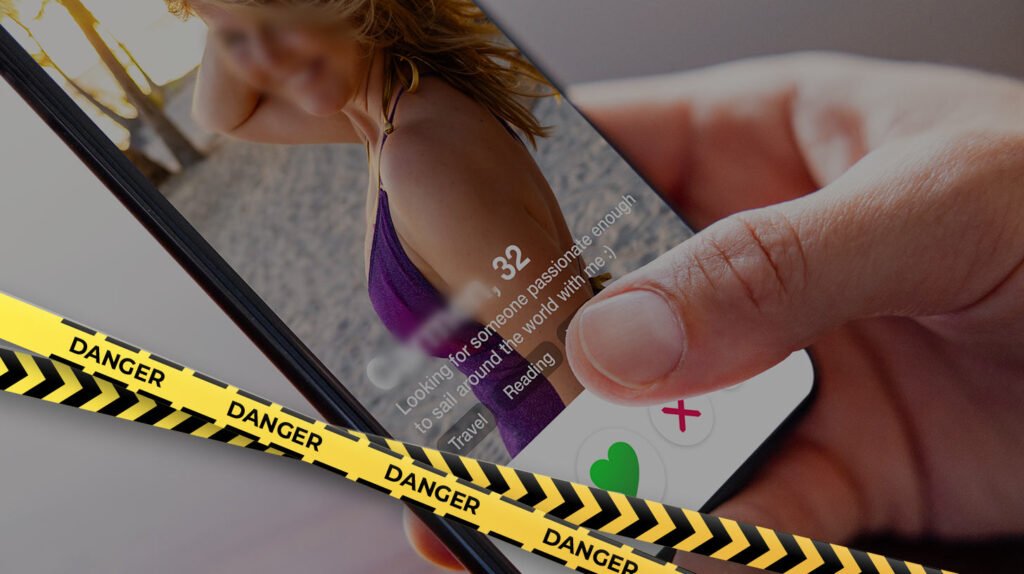In the landscape of digital dating, Tinder stands as a beacon of hope for forging new relationships. Yet, beneath its facade of digital introductions lies a chilling reality—a world where the pursuit of companionship can intersect with danger.
The tales that follow serve as cautionary reminders, revealing the perilous paths woven within the seemingly innocuous swipes and chats, showcasing the unforeseen threats that loom within the realm of Tinder’s digital embrace.
Danueal Drayton
The Tinder Predator: Unveiling Danueal Drayton’s Reign of Terror

In a horrifying twist of fate, the case of Danueal Drayton, a 31-year-old man, emerged as a dark example of the perils lurking within the digital dating world. In 2018, Drayton was charged with the brutal murder of Samantha Stewart, a 29-year-old nurse from Springfield Gardens. Their paths crossed tragically on Tinder, a platform designed for connection, which instead facilitated a deadly encounter. Stewart, an innocent and unsuspecting individual, was lured into a nightmare that ended with her being raped and strangled. This heinous act was not Drayton’s first brush with violence. His criminal record, stretching back to 2011 in Connecticut, revealed a disturbing pattern of strangulation, harassment, and other violations. Yet, a glaring oversight in the justice system – a paperwork mix-up – allowed Drayton to walk free on bail from an unrelated case in Nassau County, N.Y., where he had been accused of choking a former girlfriend.
Justice’s Oversight: The Catastrophic Trail of Danueal Drayton
After murdering Stewart, Drayton fled to Los Angeles, leaving a trail of deceit and theft, using Stewart’s driver’s license and credit card to facilitate his escape. His eventual capture in North Hollywood, where he was found detaining another woman, marked the end of a cross-country crime spree. This case not only highlights the dangers inherent in online dating platforms but also underscores the critical failures in the judicial system’s handling of criminal records and inter-state communication. Drayton’s case, now laden with charges including second-degree murder, sexual misconduct, and larceny, stands as a grim reminder of the catastrophic consequences of system failures. It raises serious questions about the safety and reliability of online dating platforms and the efficacy of judicial procedures.
Aubrey Trail
The Dark Web of Deception and Murder on Tinder

The case of Aubrey Trail is a grim and disturbing story that unfolded in Nebraska. In 2017, Sydney Loofe, a 24-year-old woman, went missing after a Tinder date with Bailey Boswell in Wilber, Nebraska. This date turned out to be a fatal trap set by Boswell and her accomplice, Aubrey Trail. Loofe’s dismembered remains were later found in a field near Edgar, Nebraska, about 90 miles from where she was last seen.
Trail and Boswell’s involvement in this heinous crime was evident from the start. They initially denied any role in Loofe’s death, but as the investigation progressed, Trail confessed, while Boswell continued to claim innocence. The prosecution presented evidence showing the couple purchasing items like bleach, saws, and trash bags shortly before Loofe’s disappearance. Cell tower data also placed them in the vicinity of Loofe on the date of her disappearance.
Trail’s background is marked by a troubled childhood, characterized by abuse and a life of moving between foster homes and juvenile facilities, eventually leading to prison time for armed robbery. This background paints a picture of a life steeped in violence and instability.
Escaped from Ted Bundy: Here are the stories of some of the women who survived him.
Aubrey Trail: Unveiling the Depths of Depravity
During his trial, Trail’s behavior was erratic and violent. He disrupted proceedings by yelling out in court and even went as far as to cut his own throat with a razor blade he had smuggled into the courtroom. Despite these actions, the Nebraska Supreme Court rejected his appeal for a mistrial. The court ruled that allowing mistrials in such cases would enable criminal defendants to manipulate the judicial process to their advantage.
Trail was sentenced to death for the first-degree murder of Sydney Loofe, while Boswell received a life sentence for her role in the crime. The case is a chilling reminder of the dangers of online dating and the depths of human depravity. It also raises questions about the effectiveness of the criminal justice system in dealing with individuals who have a history of violent behavior.
Thomas R
The Tinder Jealousy Turned Fatal

Thomas R., a 27-year-old man from Leek in Groningen, was convicted for the murder of American student Mieke Oort. In the Netherlands, this case later became known as the “Tinder Murder”. The two met through the famous dating app in the fall of 2021. Their contact diminished though after a few weeks as Oort began a relationship with another man.
The incident occurred in the early hours of March 6, when R. saw Oort dancing with her new boyfriend at a house party in her student residence. Overcome by jealousy, R. drove back to his hometown, armed himself with a large kitchen knife, a hammer, and two Molotov cocktails, and returned to Leeuwarden. He launched a petrol bomb against the house before entering and stabbing Oort multiple times. Oort’s boyfriend was also seriously injured in the attack.
Echoes of Jealousy and Fatal Consequences
R. confessed to these violent acts. The Public Prosecution Service recommended a prison sentence of twenty years and compulsory psychiatric treatment at a TBS institution. The court, however, sentenced him to 15 years in prison, acknowledging his autism spectrum and personality disorders, which they believed contributed to his inability to handle elevated emotions and increased vulnerability to psychological disturbance.
The court rejected R.’s defence that he acted spontaneously, noting his deliberate actions in arming himself and breaking into the house. The ruling was a disappointment to Oort’s family, who expressed their dissatisfaction through their attorney, Sébas Diekstra, stating that the sentence was significantly less severe than what might have been imposed in the United States.
Jesse Kempson
The Chilling Tinder Tragedy of Grace Millane

The murder of Grace Millane, a British tourist, by Jesse Shane Kempson in Auckland, New Zealand, in December 2018, is a tragic and disturbing case that garnered significant attention. Grace Millane, who had recently graduated from the University of Lincoln with a degree in advertising and marketing, was on a backpacking tour during her gap year. She entered New Zealand on November 20, 2018, and travelled around the upper North Island before arriving in Auckland on November 30.
A Fateful Tinder Encounter
On December 1, 2018, the night before her 22nd birthday, Millane was seen with Jesse Kempson at the CityLife Hotel on Queen Street in Auckland. Her parents became concerned after she did not respond to birthday wishes on December 2, and she was reported missing three days later. The hotel reported that she did not return to her room that night. Initially, there was no evidence of foul play, but the police later gathered evidence that she was no longer alive.
The Tinder messages exchanged between Grace Millane and Jesse Shane Kempson played a crucial role in the investigation and trial surrounding Millane’s murder. These messages were released in 2019 and presented to jurors during Kempson’s three-week trial, where he was found guilty of murder.
Deadly Messages
The conversation began with Kempson sending the first message on the dating app, and initiating contact with Grace. He wrote: “Hey Grace how are you?? Much planned for the weekend?” Grace responded by telling him it was her birthday the next day and that she had no specific plans. Kempson then suggested they go for a drink. Grace appeared initially hesitant to meet the local man during her travels, responding with ‘maybe’ to his proposals.
Kempson persisted, asking “maybe yes??” This prompted Grace to suggest that he ‘convince’ her. Kempson offered to ‘shout’ free booze for Grace and recommended a ‘cool Mexican place’. Grace told him she was ‘maybe’ up for drinks, but when Kempson suggested another venue, she replied, “I haven’t said yes yet?” In a response that later took on a chilling significance, Kempson replied, “you haven’t said no either.”
The pair eventually met for a date in Auckland, which ended tragically with Grace returning to Kempson’s room, where he fatally strangled her. The following day, when Grace failed to contact her family and did not respond to birthday messages, concerns were raised, leading to her being reported missing. Her body was found in a mountain range outside of Auckland a few days later.
Deception and the Dark Side of Online Dating
These messages, while seemingly innocuous at first, later revealed the manipulative tactics employed by Kempson to lure Grace into meeting him, culminating in the events that followed. The case highlights the potential dangers of online dating and the importance of being cautious when meeting someone for the first time.
Jesse Kempson, then 26 years old, was taken into custody on December 8, 2018, and charged with Millane’s murder. Millane’s body was found on December 9, off Scenic Drive in the Waitākere Ranges, about 19 km west of central Auckland. A post-mortem examination was conducted on December 10.
Kempson Trial
Kempson was tried at the Auckland High Court in November 2019. He claimed that Millane had died during consensual sex. After a three-week trial, he was convicted by a unanimous guilty verdict and later sentenced to life imprisonment, with a minimum non-parole period of 17 years. Kempson filed an appeal against his conviction, which was dismissed by New Zealand’s Court of Appeal on December 18, 2020. The New Zealand Supreme Court lifted the suppression order on his name on December 22, 2020. It was also revealed that he had been convicted of rape and sexual abuse charges relating to two other women in October and November 2020.
Millane’s death led to an unprecedented reaction from the New Zealand public. Prime Minister Jacinda Ardern made a public apology to Millane’s family, expressing sorrow that Millane was not safe in New Zealand.
In a world where digital connections can take a terrifying turn, these chilling cases illuminate the dangers lurking in the realm of online dating.
Let’s turn from Tinder to Social Media; Here are 5 Times that social media users unmasked criminal cases.

